Grantee Perception Report: What We Heard and How We Plan to Do Better
By Don Chen and Jon Goldberg
Have you ever had food stuck in your teeth and only found out when you looked in the mirror hours later? If you’re like us, you probably thought, “Why didn’t anyone tell me?” The truth is that it’s tricky to give honest feedback to the people who give out grants.
Yet we all know that honest feedback is essential to improve our work. As a racial justice funder, we also know that shifting power and building equity, mutual accountability, and authentic, trusting relationships are vital to our grantmaking. And as people, we appreciate when folks share their opinions (good and bad) of what it’s like to work with us and tell us when we have food in our teeth!
That’s why we’ve partnered with the Center for Effective Philanthropy (CEP) to periodically survey our grantees to understand how we’re doing as a partner in our shared work. This is our fourth such survey since 2004.
In late 2020, the CEP asked approximately 300 Surdna and Andrus Family Fund grantee organizations to participate in an independent, confidential survey. Fifty-two percent of grantees completed the survey, which CEP then analyzed and prepared as a Grantee Perception Report comparing our results to prior years and a larger set of foundations.
We want to thank everyone who completed the survey amid a pandemic and the 2020 presidential election. Its findings show significant improvements in some areas and new challenges in others.
Here’s what we heard and how we plan to do better.
Our commitment to racial and social justice is a strength.
We’re proud that grantees noted Surdna’s focus on social justice as a strength, describing the Foundation as clear and consistent about its “strategic investments in communities of color.”
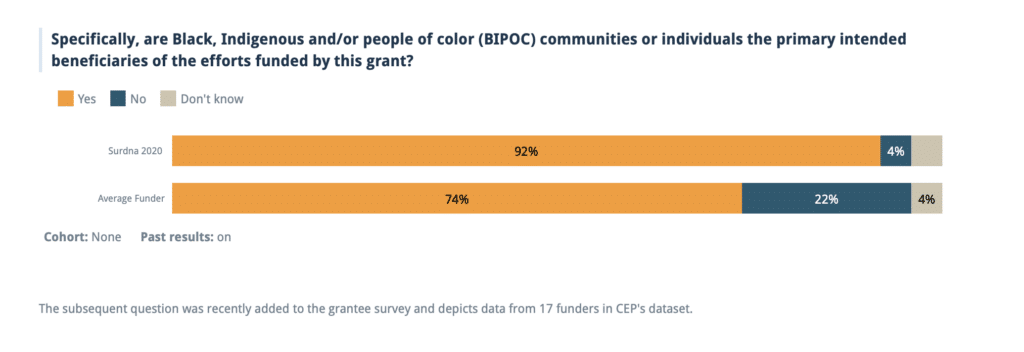
More than 90 percent of respondents reported that their grants were primarily meant to benefit historically disadvantaged groups, and specifically Black, Indigenous, and people of color communities, which is central to Surdna’s mission. On several diversity, equity, and inclusion (DEI) measures, grantees noted our firm commitments to DEI, communicating what it means for our work, and combatting racism.
What we’re doing to improve:
- Collecting and sharing demographic data about the Foundation and grantee partners to learn how our racial justice values show up in our portfolio of grantees, and to contribute to the public dataset of demographic diversity of philanthropic giving. In the spirit of transparency, we will soon publish aggregate demographic data about the Foundation and the organizations we fund. We are also proactively sharing our data with Candid and signing on to data-sharing initiatives, such as the Climate Funders Justice Pledge.
- Embarking on a learning journey to become an antiracist organization. In the coming years, our board and staff will examine our policies, practices, and accountability mechanisms and adjust them to further dismantle racism and accelerate equity.
Multi-year general support is invaluable.
Grantees like that we provide unrestricted support and asked us to give even larger and longer general support grants. (Seventy-six percent of our grants were unrestricted at the time of the survey.) During the pandemic, we also significantly streamlined our grants application and reporting requirements; grantees told us loud and clear that we should make these adjustments permanent.
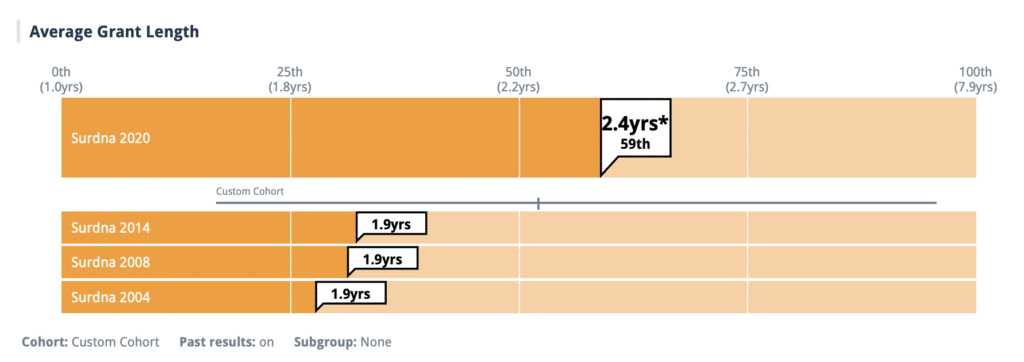
What we’re doing to improve:
- This year, we’re increasing multiyear general support grants to offer grantee partners the certainty and flexibility they need to advance long-lasting progress toward racial justice. For example, we are increasing our maximum grant duration from three to six years. Each year, we will determine the exact amount of budget available for six-year grants by an annual valuation of our endowment. It’s important to note that we are limiting the number of six-year grants. Why? Because we want to keep ample funding available to bring new organizations into our portfolio and to respond to pressing needs. Case in point: During the pandemic, we were able to make over 100 rapid response grants of up to $50,000 each. We view this process as one way we can be responsive to our grantee partners’ immediate needs.
- We are making our streamlined grant and reporting processes permanent. For example, most grant renewals no longer require a proposal. Many grant reports can be done through a simple phone discussion. And most organizations no longer need to submit organizational financial information when they apply for a grant. In addition, we are doing an extensive review of our proposal and reporting processes to lessen the burden of applying for and reporting on grants.
We need to communicate clearly, consistently, and responsively.
Respondents asked for more “consistent, clear, and frequent communications.” They asked that we give them more opportunities to provide input into program strategies and “proactively reach out with new funding opportunities.” They also told us that we could better communicate and seek input on how we assess our progress.
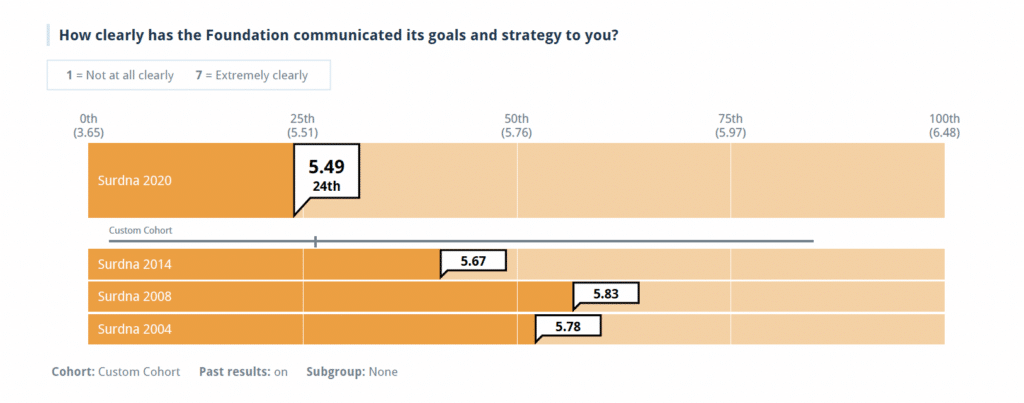
Finally, grantees told us they’d like us to respond more quickly to their calls and emails. That said, we heard that the quality of interactions was positive and appreciated once our staff responded.
What we’re doing to improve:
- Launching a “clarity project” to update how we talk about our grantmaking and strategies on our website and communicate proactively with grantees through a new newsletter and other communications.
- Focusing on opportunities to listen and learn with our grantees through Town Halls, grantee learning cohorts, and other forums.
- Looking at how to be more responsive, including interrogating how we’re staffed, how to dedicate more time to grantee relationships, and simply communicating when it’ll take us longer to get back to folks.
- Changing our unsolicited Letter of Inquiry (LOI) policy. We recognize that we have limited resources, nonprofits have limited time, and few unsolicited letters of inquiry have historically led to a grant. Given these realities, we have decided to stop accepting unsolicited LOIs. Our old system required nonprofit organizations to give information and receive nothing in return. We saw that practice as needlessly extractive and have ended it. This policy change doesn’t mean we don’t consider new grant applicants. But we do use other methods. Our program staff conduct research and build relationships with the communities they serve, which often lead to new organizations coming into our portfolios. We also develop partnerships with regranting partners and participatory grantmaking initiatives to ensure people closest to the problems have a say in how and where the funding flows to their communities. Finally, we’ve created a sign-up form to receive updates on new funding opportunities.
Support beyond the grant makes a big difference.
Our grantee partners said we’re doing better at helping “beyond the money” than in prior years, with nearly half noting that we helped them secure funding from other sources. They also requested that the Foundation provide more opportunities for organizations to convene and collaborate.
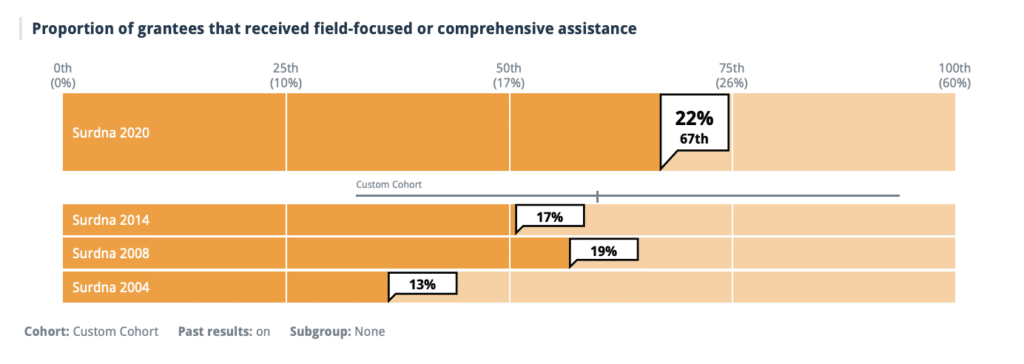
What we’re doing to improve:
- A culture of care. Working on the frontlines of racial justice amid a pandemic can take a heavy toll in many ways. In response, our Sustainable Environments Program is partnering with JustFund and the Amalgamated Foundation to offer its grantee organizations small grants to care for their staffs’ health and wellbeing.
- Offering access to financial consulting. For those grantee organizations that are experiencing financial challenges, we’re now offering additional support for financial consulting.
- Learning together. To make progress on thorny systemic issues, we must understand where we’re going and learn from the wins and challenges along the way. To that end, our Learning and Grants Operations team is partnering with Surdna programs, grantees, and peer funders to set and track shared outcome metrics and learning plans that are meaningful to grantees and the broader field, not just to our staff and board. For example, we recently published “Measuring Together: A Learning Approach for Inclusive Economies.” We are committed to posting more reports like this—sharing our lessons, successes, and failures—with grantees, funders, and beyond.
- Shifting power. The Andrus Family Fund, which is part of Surdna, is ensuring that movement partners and young people are at the decision-making table through the Visionary Freedom Fund, a participatory grantmaking initiative, and a strategic plan refresh that follows the lead of movements. AFF has also diversified its board to make it more accountable to the communities it serves.
It’s all about trust.
Surdna’s success depends entirely on our grantee partners’ success. And trust is fundamental to our collective success. Like many funders, we’re deepening our trust-based and racial justice philanthropic practices, which are all about the relationships you build with grantees, how you show up, and how you learn together.
On a practical level, trust-based practices underpin almost everything we’re doing to be a better organization and funder. We’re prioritizing listening and responding to grantees’ needs, being in community with them, and showing up beyond the check. We’re also letting go of practices that don’t advance our grantee’s work and mission of making the world more equitable. In fact, all of the time-saving, grantee-centering practices we instituted at the start of the pandemic have been permanently adopted, and in many cases expanded.
Thank you!
Thanks again to everyone who shared their honest opinions about their experience with us and for telling us we had some food stuck in our teeth. Your feedback and trust help us learn and do better. We know that we won’t always get it right. But we are committed to listening, learning, and doing our best to serve our grantees every step of the way.
In solidarity,
Don Chen and Jon Goldberg
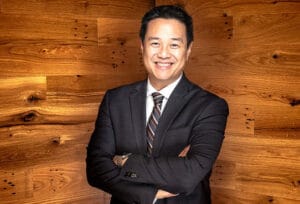

Read the report

